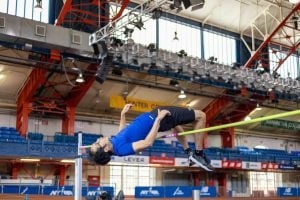
Kaze Wong joined the Department of Mathematics and Statistics on August 1 from the Flatiron Institute where he was a postdoctoral researcher. The new assistant research professor and part-time research software engineer at the Data Science and AI Institute, shares his insights on various aspects of data science, including deep learning, Bayesian inference, and generative modeling, with a focus on practical applications.
Tell us a little about yourself.
I was born and raised in Hong Kong, where I did my undergraduate degree in physics. I came to JHU for a PhD program in physics and astronomy, and I went to the Flatiron Institute’s Center for Computational Astrophysics, in New York City for a postdoc before joining JHU.
I am also a part-time software engineer with the Data Science and AI Institute and a volunteer high jump coach for JHU’s track and field team.
Describe your research.
I have a broad interest in many topics related to data science, including designing high-performance deep learning systems, Bayesian inference, and deep generative modeling, and applying these techniques to solve real-world problems. One common theme about my research is that whatever I do, it usually must be connected to the real world, whether it is about releasing software or building hardware. I usually do not consider a project done until there are people outside of my typical collaboration circle using the products I build.
Roughly speaking, I spend 20-30% of my working hours thinking about data problems in physics/astronomy, 30% thinking about how to construct neural networks to make them more efficient and robust, and the remaining hours developing software (occasionally hardware) to solve domain-specific problems.
What are some real-world applications of your research?
Much of my research is about inference problems. In these problems, we’re given some data, and our goal is to make educated guesses about important properties of the system we are studying. For example, I have spent a lot of time thinking about how to make inferences in gravitational waves fast. These are ripples in the spacetime continuum generated by the most violent events in the universe, such as a pair of black holes colliding close to the speed of light. Our task is to guess the masses of the black holes from the tiny fluctuations—1/1000 times the size of a hydrogen atom—that we see in our detectors.
I also release a lot of open-source software on GitHub. Here are some examples of software that I am either leading the development of or contributing significantly to:
- flowMC: Machine learning enhanced MCMC sampler. A simple yet powerful tool to solve inference problems.
- ripple: Gravitational waveform models in Jax, support automatic differentiation and GPU acceleration out-of-the-box
- jim: High-performance parameter estimation tool for gravitational waves.
What drew you to this field and focus area?
In software engineering, I always enjoyed solving puzzles and building things, which translates into my deep care for solving real-world problems and building software. On one hand, solving real-world problems means I can deploy my solutions and observe changes. On the other hand, building software is like meditation for me. I enjoy getting lost in trying to solve problems and designing nice code. The flow state it puts me in is very enjoyable for me.
As for domain-specific interests, such as astrophysics or machine learning, they usually start with my thought that “That looks cool.” I can invest in a domain for a while if it piques my interest in some way.
What excites you about bringing this work to Johns Hopkins?
I am very excited to create more multidisciplinary collaborations that include data science and software at JHU. As one of the top research universities, JHU has researchers working in so many different interesting domains, from medicine to astrophysics. I see tremendous potential in bringing data science and production-grade software engineering to all these domains, and I believe if JHU continues to invest in this direction, we are going to create invaluable products that benefit society.
What are some of your goals for this first year at JHU?
Aside from settling into my own research program, grants, and teaching, I really want to help build the department’s computational infrastructure and support other people’s research as a computing specialist. At my previous jobs, including the Flatiron Institute and JHU Physics, I learned a lot from others in the field, even though I am not an expert, by assisting others with their computational needs. I enjoy the process of making things more efficient and automated, and that is what I hope to bring to the department and JHU in general.
Anything else we should know? Any fun facts?
I am *very serious* about the high jump, which is a track and field event in which a person jumps over a crossbar. I volunteer as a track and field coach and am training for the 2028 Los Angeles Olympics. To improve my performance, I devote a significant portion of my free time to training and developing data science solutions. If people are interested in building AI products for athletics, please get in touch!
I also play several musical instruments, including violin, bass, guitar, drums, and some piano. I consider the violin my main instrument, but I used to play the bass in a band.